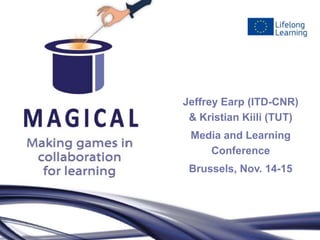Magical project & magos game builder
- 1. Jeffrey Earp (ITD-CNR) & Kristian Kiili (TUT) Media and Learning Conference Brussels, Nov. 14-15
- 2. MAGICAL snapshot What? learning through collaborative game building When? January 2012 – April 2014 (27 months) How? EACEA LLP KA3 (ICT) Multilateral Projects - Institute for Education Technology, CNR (IT) - Tampere University of Technology - TUT (FI) Who? - Manchester Metropolitan University (UK) - Katholieke Universiteit Leuven (BE) Media & Learning Conference, Brussels 15/11/2012
- 3. Main project objectives • Develop and test a learning methodology that addresses four key skills: collaboration, creativity, problem-solving and digital literacy • Design and implement a game-based environment that: – embodies a collaborative, fun, hands-on approach to learning – supports game building in groups … as a game! • Investigate whether & how the adopted approach & tools can contribute to developing soft/transversal skills • Support broader uptake of collaborative game making in educational processes Media & Learning Conference, Brussels 15/11/2012
- 4. Target populations • Students in primary & lower-secondary school plus • Student teachers and in-service teachers • Staff in social services & health involved in education/training: e.g. for special needs Media & Learning Conference, Brussels 15/11/2012
- 5. Core activities • Creation of digital environments for designing and implementing collaborative game building activities – MAGOS game building environment – pedagogical planning tool • Short courses for pre/in-service teachers and professionals in health sector • Set of classroom experiments (UK, IT, BE, FI) • Analysis of collaborative game building & key/transversal skills Media & Learning Conference, Brussels 15/11/2012
- 6. Main expected outputs • Magos game authoring environment • Pedagogical planning tool • Set of ready-to-go educational games • Set of reusable pedagogical plans • Guide for classroom practice • Toolkit for teacher/educator training courses Media & Learning Conference, Brussels 15/11/2012
- 7. Media & Learning Conference, Brussels 7
- 10. Magos portal 11/22/2012 Name of the event/initiative 10
- 11. Magos game editor • 1-4 users can create a game simultaneously • Games are created with magic spells • Four different spell sets exits – Level design spells (Architectus) – Physics spells (Physicus) – Audio-visual spells (Artifex) – User experience spells (Principes) • Users can change spell sets Media & Learning Conference, Brussels 11/22/2012 11
- 12. Magos prototype Media & Learning Conference, Brussels 11/22/2012 12
- 13. Basic game mechanics • Collect • Push • Dialog • Combine • Avoid 11/22/2012 13
- 14. Idea generation tool 11/22/2012 Name of the event/initiative 14
- 15. Visit MAGICAL’s stand and test your design skills with Magos paper prototype! 11/22/2012 Name of the event/initiative 15
- 16. Join us! www.magical-project.net www.mendeley.com/groups MAGICAL collaborative magical@itd.cnr.it game design for learning Media & Learning Conference, Brussels 15/11/2012
- 17. Thank you! Kristian Kiili Tampere University of Technology Media & Learning Conference, Brussels 11/22/2012 17
Editor's Notes
- #8: How many of you have played digital games?How many of you have created a digital game?How many of you have created a digital game in multiuser game creation environment?
- #9: Current school system - We have to introduce new learning methods to answer the demands of our society
- #10: By selecting game-authoring approach instead of programming we want to make the adoption of the environment easier for the end users.Focus on creative processes and 21st century skills
- #12: Imagine that Jeff is a stone in the game world. He is solid object. I will cast a spell on the stone to make it pushable. Tadaa!
- #13: The example game is platform, but you can do more. Top-down, puzzle elements
- #14: push two hydrogen atoms together to form h2 -> push h2 molecule together with oxygen atom to form water (h20).2) push water to fire in order to put out the fire SOKOBAN
- #15: Sometimes it is hard to generate ideas for the gameTeachers would like to direct students attention to certain learning themeCame should not always need to be educational – design process itself is the learning situation
- #16: Paper prototype can be used to teach the idea of Magos

















